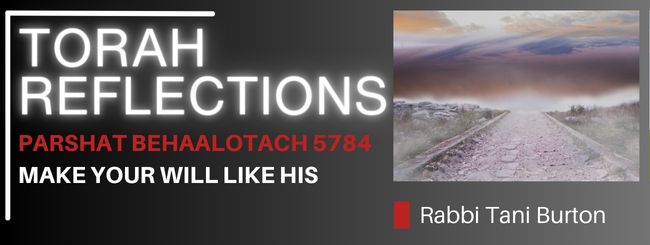בס”ד
Parshat Behaalotcha
Integrating Torah into one’s life through reflection and conversation can be an incredibly fun and engaging experience. It’s a journey of discovery, where ancient wisdom and timeless teachings come to life in our daily experiences. Through reflection, we have the opportunity to dive deep into the rich tapestry of Torah, extracting profound insights and lessons that resonate with our modern lives. The joy lies in the ‘aha’ moments, those instances when a Torah verse or story suddenly connects with our personal challenges, aspirations, and values. And when we engage in conversations about Torah with others, it becomes an interactive exploration, where diverse perspectives and interpretations enhance our understanding. These dialogues often spark excitement and intellectual curiosity, making the learning process both enjoyable and fulfilling. Torah becomes a vibrant and dynamic part of our lives, offering not just guidance but also a source of endless fascination, connection, and growth.
NOTE: Don’t feel obligated to go through every source or answer all the questions—unless you want to. Even one source, or one question will give you plenty of material for discussion and meditation. Enjoy this!
Some thoughts from the parsha (Pirkei Avot, Chapter 2)
The Mishnah from Pirkei Avot 2:4 teaches a profound lesson about aligning our will with the will of G-d. It emphasizes that our ultimate goal should be to make G-d’s will our own, so that His desires become our desires. This concept contrasts with historical examples where human willpower was misdirected, such as the biblical episode of the Tower of Babel. These instances illustrate the immense power of collective human will, often used for misguided purposes.
Rabban Gamliel’s teaching urges us to transcend mere human ambition and submit our will to G-d’s Divine plan. By doing so, we become conduits for fulfilling His vision for the world rather than obstructing it. This perspective doesn’t diminish personal initiative but elevates it to a higher purpose, aligning our actions with G-d’s intentions.
For Noahides, who adhere to the Seven Noahide Laws derived from the Torah and applicable to all humanity, this teaching offers a profound ethical framework. It invites reflection on how they approach their ambitions and decisions, ensuring they are in harmony with G-d’s will as expressed through these universal principles.
Now, reflect upon the following questions:
- How do you define your own will and ambitions? Are they currently aligned with any higher purpose or principle?
- Reflecting on historical examples like the Tower of Babel, what dangers do you see in unchecked collective human willpower?
- What does it mean to submit your will to a higher authority or purpose? How does this idea resonate with your personal beliefs or values?
- Can you recall a time when aligning your will with a greater purpose led to a positive outcome or personal growth? How did it feel to be in sync with a larger goal?
- What challenges do you face in aligning your ambitions with ethical principles or Divine Will? How do you navigate these challenges in your daily life?
Shabbat Shalom!
By Rabbi Tani Burton
If you want more questions for contemplation, SEE THE OTHER BLOGS FROM RABBI TANI BURTON ABOUT DE PARSHAT QUESTIONS
© Copyright, all rights reserved. If you enjoyed this article, we encourage you to distribute it further.
Our blogs may contain text/quotes/references/links that include copyright material of Mechon-Mamre.org, Aish.com, Sefaria.org, Chabad.org, and/or AskNoah.org, which we use in accordance with their policies.
